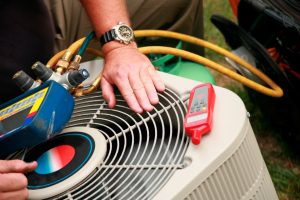 Laymen should never attempt to repair their air conditioners themselves, but you don’t need to be an expert to spot the signs of an air conditioner that isn’t doing its job. Among the most common signs of trouble are warm air coming for your vents when you have the air conditioner on, or even air that’s cool, but not nearly as cool as it should be. It sounds like a minor nuisance at best, but if it isn’t addressed, it can end up costing you a pretty penny. What causes it, and what kinds of damage can it inflict on your system? Read on for the answers.
Laymen should never attempt to repair their air conditioners themselves, but you don’t need to be an expert to spot the signs of an air conditioner that isn’t doing its job. Among the most common signs of trouble are warm air coming for your vents when you have the air conditioner on, or even air that’s cool, but not nearly as cool as it should be. It sounds like a minor nuisance at best, but if it isn’t addressed, it can end up costing you a pretty penny. What causes it, and what kinds of damage can it inflict on your system? Read on for the answers.
The Causes
The causes of loss of cool air can range across a number of components and involve a wide variety of repair options, which is why you need a trained and licensed professional to work on the system. Common causes include, but are not limited to, the following:
- Reduced levels of refrigerant, which can cause ice to form on the coils and lower its cooling potential.
- An overheating component, such as the fan motor, which may need to be replaced. Otherwise, the heat it generates will bleed into the air and lower the efficiency of the entire system.
- A breach or a leak in the ducts, which either pulls hot air into the system, or pulls cool air out. Either way, the air won’t arrive as cool as it should be.
- Uninsulated portions of ducts, which may be in a sunbeam or perhaps warmed by a nearby hot water pipe. That can get bad enough to affect the temperature of the air when it emerges from the vents.
- Blockages in the outside vents, which will cause the heated air to remain stuck in your system and can cause a huge breakdown very quickly if you aren’t careful. (Always clean any brush or detritus away from your air conditioner’s external components before cooling season begins.)
The Problem
With air conditioning systems, efficiency is the name of the game, and an air conditioner doesn’t blow cool air in the required amounts, it’s going to have to work harder to do its job. That can cause your monthly cooling bills to spike, and increase the strain on the other components in the system: raising the chances of a more serious breakdown in the future.
That can have a cascading effect as the problem goes on. The blown air gradually gets warmer, the air conditioner has to work even harder, and the resulting spiral will hasten the chances of a breakdown. The first step is to turn the air conditioner off so that the damage doesn’t continue. Then call a qualified repair service to accurately diagnose the problem and offer the correct solution. Spring is the best time to do this because the local weather is still cool, giving you plenty of windows where you won’t need your air conditioner and the system will be ready to go when the first heat wave hits!
For quality air conditioning repair in Seaford, DE, call the professionals at Atlantic Refrigeration & Air Conditioning, Inc. today!
